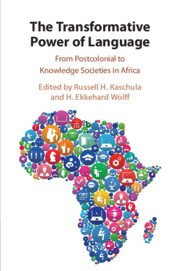Book contents
- The Transformative Power of Language
- The Transformative Power of Language
- Copyright page
- Contents
- Figures
- Tables
- Contributors
- Preface
- Abbreviations and Acronyms
- Introduction
- Part I Mental Decolonisation and Cultural Diversity
- Part II Multilingualism and Intellectualisation of African Languages
- Part III Digitalisation and Democratisation of Knowledge
- Part IV Interlingual and Intercultural Cross-Fertilisation
- 14 Orality in the Digital Age
- 15 Interpreting Research in South Africa
- 16 Exploring the Potential of Increasing Epistemological Access for University Students of African Languages through the Translation of English Academic Texts
- 17 Translation in Foreign Language Teaching
- Index
- References
17 - Translation in Foreign Language Teaching
Cultivating Critical Reflection and Symbolic Competence
from Part IV - Interlingual and Intercultural Cross-Fertilisation
Published online by Cambridge University Press: 18 September 2020
- The Transformative Power of Language
- The Transformative Power of Language
- Copyright page
- Contents
- Figures
- Tables
- Contributors
- Preface
- Abbreviations and Acronyms
- Introduction
- Part I Mental Decolonisation and Cultural Diversity
- Part II Multilingualism and Intellectualisation of African Languages
- Part III Digitalisation and Democratisation of Knowledge
- Part IV Interlingual and Intercultural Cross-Fertilisation
- 14 Orality in the Digital Age
- 15 Interpreting Research in South Africa
- 16 Exploring the Potential of Increasing Epistemological Access for University Students of African Languages through the Translation of English Academic Texts
- 17 Translation in Foreign Language Teaching
- Index
- References
Summary
The chapter explores translation in a foreign-language course at a South African university and argues that the explicit practice of translation and concurrent reflective writing foregrounds the negotiation of meaning between languages and cultures. The study proposes fair assessment practices for a multilingual, multicultural context, as reflective writing nurtures student diversity and individualised learning. In translation courses, students and lecturers must ideally share a home language and second/ foreign language, in this case German and English, but often do not. Subsequently, clumsy English translations might not accurately reflect students’ understanding of the German source text, nor their contemplation of equivalent language transfer. The reflective essays, however, revealed evidence of deep engagement with language in context and re-evaluation of linguistic and cultural assumptions. The reflections also created a diagnostic space where comprehension errors or misconceptions could be addressed on an individual basis. The study finds that teaching translation in foreign language courses stimulates critical reflection on language, provided that assessment methods match such learning outcomes.
Keywords
- Type
- Chapter
- Information
- The Transformative Power of LanguageFrom Postcolonial to Knowledge Societies in Africa, pp. 351 - 370Publisher: Cambridge University PressPrint publication year: 2020

